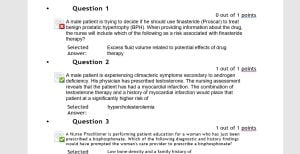COURSE
NURS 6521 Advanced Pharmacology
Number of Questions; 1 – 101
- Question: A male patient is trying to decide if he should use finasteride (Proscar) to treat benign prostatic hypertrophy (BPH). When providing information about the drug, the nurse will include which of the following as a risk associated with finasteride therapy?
- Question: All of the following systemic drugs interfere with metabolism of oral contraceptives except
- Question: The first line drug choice for a previously healthy adult patient who has been diagnosed with community acquired pneumonia would be
- Question: Whatisthebestinitialtreatmentplanforaslepdisorderintheolderadultpatient?
- Question: A patient is receiving radiotherapy for an overactive thyroid gland and asks whether her milk is safe for her baby. If her treatment cannot be discontinued, what should the nurse recommend?
- Question: A Nurse Practitioner is providing patient education to a 50-year-old woman who is taking methotrexate (MTX) for breast cancer. The nurse will instruct the patient to avoid which of the following drugs?
- Question: When a NP chooses a benzodiazepine to treat anxiety the prescriber needs to be aware of the possibility of dependence. The Benzodiazepine associated with the greatest likelihood of causing rapid dependence is:
- Question: Mr. Asberry is taking Levofloxacin for his sinusitis. He calls your clinic and reports some pain just above the heel of his left foot. The NP should:
- Which of the following patients will be at the greatest risk for anemia and would be the most likely candidate for epoetinalfa therapy?
- Question: Which of the following is a true statement about aspirin and its action on platelets
- Question: A nurse practitioner orders 150 mg of oral fluconazole for a patient with vulvovaginal candidiasis. The patient should expect to take medication
- Question: A Nurse Practitioner will monitor which of the following when assigned to a patient taking allopurinol for chronic gout who visits the clinic every 2 months?
- Question: A 46-year-old man is receiving a quinupristin/dalfopristin IV infusion for a life-threatening infection. Which of the following would be most important for the nurse to monitor?
- Question: A 38-year-old pregnant patient admits to the Nurse Practitioner that she is an alcoholic and has been consuming alcohol during her pregnancy. The nurse knows that using alcohol during pregnancy may result in a child who presents with
- Question: The nurse practitioner orders Amoxicillin 500 mg? What is the total amount of medication patient will take per day?
- Question: A quinolone used to treat a urinary tract infection would be contraindicated in:
- Question: A nurse practitioner has administered filgrastim to a diverse group of patients in recent months. Which of the following patients should the nurse observe for extremely elevated white blood cell counts following administration of the drug?
- Question: Laboratory testing has confirmed that a patient has chloroquine-resistant malaria and the patient’s physician has prescribed quinine along with an adjunctive drug. The nurse should question the physician’s order if the patient has a history of
- Question: An immunocompromised patient in a critical care setting has developed a respiratory infection that has been attributed to methicillin-resistant Staphylococcus aureus (MRSA). The nurse should anticipate that the patient will require treatment with
- Question: A 29-year-old pregnant patient is extremely upset about having to take medication for a pre-existing medical condition. She is consumed with fear that her baby will be born with a physical deformity or a congenital anomaly but knows that she has to take the medication. She talks constantly about this and is unable to sleep most nights. Which of the following is the most appropriate nursing diagnosis for this patient is?
- Question: The NP student knows that which statement below accurately describes the activity of naloxone?
- Question: Mr. Singh is a 66-year-old man who is receiving chemotherapy for the treatment of lung cancer that has metastasized to his liver. In an effort to prevent infection, Mr. Singh has been prescribed filgrastim (Neupogen). Which of the nurse’s following assessment questions most directly addresses a common adverse effect of filgrastim?
- Question: The nurse practitioner, Jill, is deciding what medication to put her patient on. She recognizes that the mechanism of action of triptans is as:
- Question: What schedule drug is alprazolam?
- Question: A 30-year-old African-American woman tested positive for TB and is prescribed isoniazid. The nurse will plan the patient’s care to include close monitoring of the drug therapy because
- Question: Which of the following medication classes should be avoided and men with BPH
- Question: Which of the following drugs can a person with G6PD deficiency take safely?
- Question: A 2-year-old child is diagnosed with a minor ailment and is to be administered medications at home for 2 weeks. The child lives with his mother, grandmother, and four other children between the ages of 14 months and 7 years. The home health nurse is asked to assess the home environment to determine if it is appropriate for the child to take his medication at home. Which of the following will have the greatest impact on the nurse’s assessment
- Question: Where the medications will be stored
- Question: A Nurse Practitioner who provides care on a pediatric unit of a hospital is aware that the potential for harm as a result of drug errors is higher among infants and children than adults. This fact is primarily due to
- Question: A patient is to begin taking tobramycin (Nebcin) for a nosocomial infection. Which of the following assessments should the nurse prioritize?
- Question: Lily, the nurse practitioner is seeing Mr. Reynolds today. She would recognize that which of the following is a potential adverse side effects of autonomic-anticholinergic agents?
- Question: A Nurse Practitioner is reviewing the pre-pregnancy medication regimen of a patient who has just had a positive pregnancy test. The nurse should be aware of which of the following changes in pharmacokinetics that accompanies pregnancy?
ANSWERS

…………..please click the icon below to purchase all answers at $22